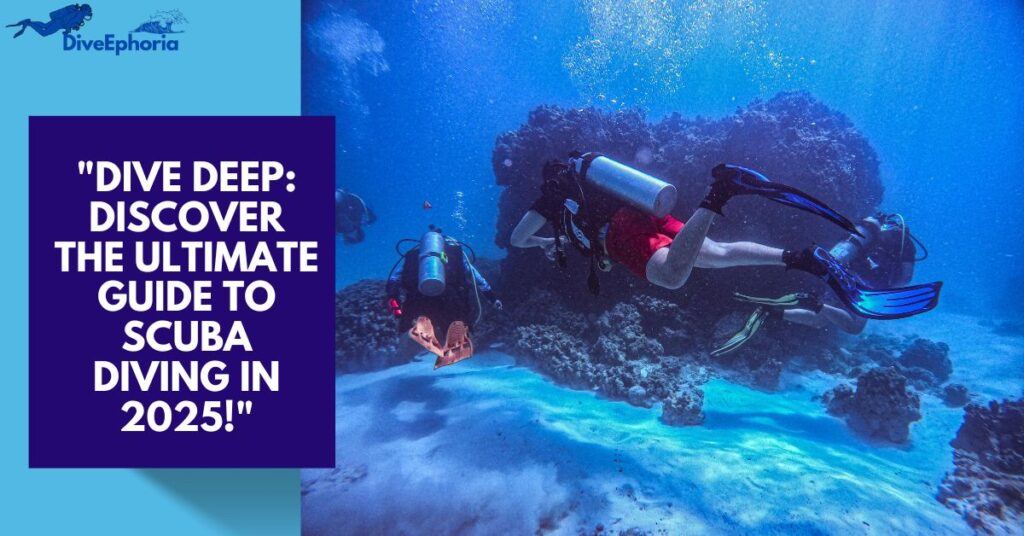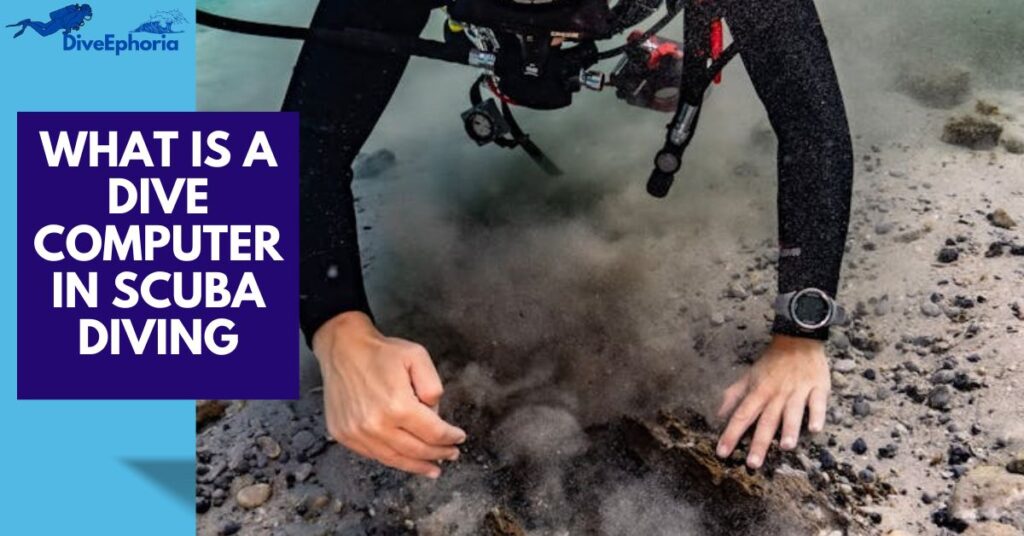![The Ultimate Guide to [What is Scuba Diving?] in 2025](https://diveephoria.com/wp-content/uploads/2025/01/1-22-1024x536.jpg)
Table of Contents
Introduction
Have you ever wondered what it feels like to explore the mesmerizing underwater world, surrounded by vibrant marine life? For many, the idea of scuba diving is incredibly appealing but also intimidating. Questions like “Is it safe?”, “What gear do I need?”, or “How do I even get started?” often hold people back from experiencing this thrilling adventure.
If you’ve found yourself stuck on these questions or unsure about how to begin, you’re not alone. Navigating the world of scuba diving can feel overwhelming without the right guidance. That’s exactly why this ultimate guide to exploring the ocean in 2025 is here — to clear up the confusion and provide a step-by-step path from curiosity to confident diver.
In this article, we’ll dive into what scuba diving really is, break down the essential equipment and training you’ll need, explain certifications, and explore the many benefits this incredible sport offers. Whether you’re a total beginner or someone just curious about underwater exploration, by the end of this guide, you’ll have all the knowledge and motivation to take the plunge and discover the ocean like never before.
What is Scuba Diving?
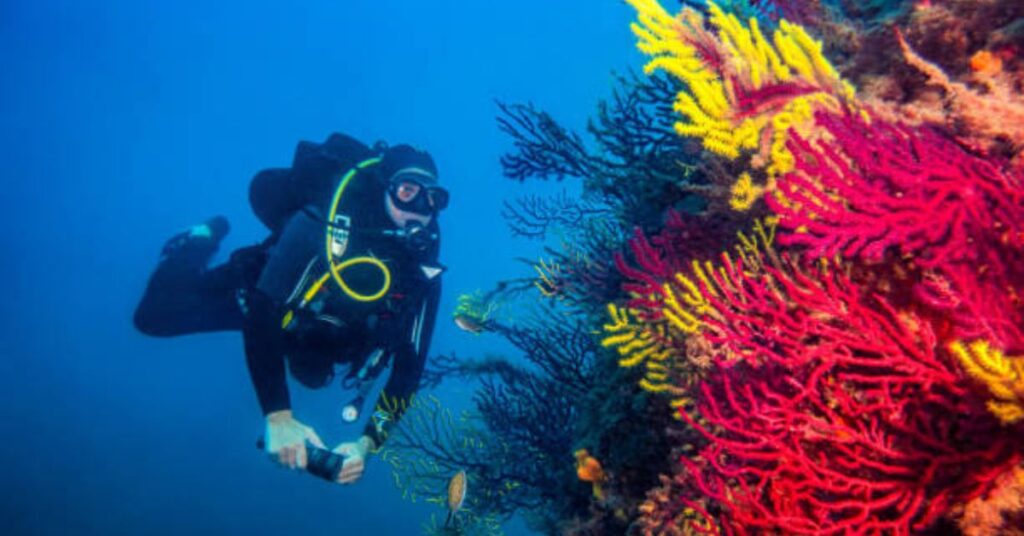
Scuba diving is an exhilarating underwater activity that allows individuals to explore beneath the ocean’s surface using a Self-Contained Underwater Breathing Apparatus (SCUBA). This specialized equipment enables divers to breathe freely underwater, giving them the freedom to navigate vibrant coral reefs, mysterious shipwrecks, underwater caves, and diverse marine ecosystems — all while feeling weightless and immersed in a completely different world.
In 2025, scuba diving remains one of the most popular and accessible ways to connect with the ocean. Whether you’re a beginner or an experienced diver, the sport offers endless opportunities to witness stunning marine life, from colorful tropical fish to majestic sea turtles and playful dolphins. With the advancement of dive gear and safety technology, scuba diving has become safer and more enjoyable than ever.
But scuba diving is much more than just an adventurous hobby. It provides a unique way to relax and disconnect from the stresses of everyday life. Many divers describe it as a meditative experience that deepens their appreciation for nature and the fragile underwater environment. Beyond recreation, scuba diving is also essential for scientific research, underwater photography, marine conservation efforts, and commercial activities like underwater construction and inspections.
If you’re searching for high-quality scuba diving gear or want to find the best beginner-friendly dive equipment, 2025 offers a variety of lightweight, durable, and user-friendly options designed to enhance your underwater experience. From beginner kits to professional-grade setups, the right magnet fishing gear for your underwater treasure hunts, or eco-friendly equipment for sustainable diving, the options are vast and tailored to every diver’s needs.
In short, scuba diving opens the door to an incredible underwater world full of discovery, adventure, and personal growth. Whether you’re exploring vibrant coral reefs, searching for hidden treasures, or simply enjoying the tranquility beneath the waves, scuba diving offers an unforgettable journey beneath the surface.
Scuba Diving Basics
What Does SCUBA Stand For?
SCUBA stands for Self-Contained Underwater Breathing Apparatus. This term describes the essential equipment that makes modern scuba diving possible: a portable system that allows divers to carry their own supply of compressed air, enabling them to breathe underwater independently of surface air sources. Thanks to SCUBA gear, divers can explore the ocean depths for extended periods, opening up incredible opportunities for underwater adventure, scientific research, and marine conservation.
The core components of SCUBA equipment include the air tank, regulator, buoyancy control device (BCD), mask, fins, and wetsuit or drysuit. Each piece plays a crucial role in ensuring safety, mobility, and comfort during your underwater exploration.
Scuba Diving for Beginners
If you’re new to scuba diving, the idea of plunging beneath the waves can feel daunting. But don’t worry — with the right training and support, scuba diving is accessible to nearly everyone, regardless of age or physical fitness. Many dive shops and resorts worldwide offer beginner-friendly programs designed to introduce you to the basics in a safe, controlled environment.
One popular option is the Discovery Dive (also called Try Dive), which allows beginners to experience scuba diving firsthand under the direct supervision of certified instructors — no full certification required. This hands-on introduction helps you learn fundamental skills like breathing underwater, clearing your mask, and equalizing ear pressure. Plus, it’s a fun way to see if scuba diving is the right hobby for you before committing to formal training.
For those ready to take the next step, beginner scuba certification courses like the PADI Open Water Diver or SSI Open Water Diver provide comprehensive training on dive theory, safety procedures, and practical skills. These certifications are globally recognized and unlock access to dive sites around the world.
The Scuba Diving Experience
Imagine slowly descending into crystal-clear blue waters, the sunlight filtering through the surface and dancing over vibrant coral reefs. Schools of colorful fish glide past as you float effortlessly, feeling almost weightless. The sounds of the busy world above are replaced by the peaceful silence of the ocean depths, interrupted only by the gentle bubbles of your breathing.
This unique underwater environment offers a sense of calm and wonder unlike any other. Many divers describe scuba diving as a meditative experience, where the mind clears and the body relaxes amidst the beauty of marine life. Whether you’re exploring a shallow reef teeming with tropical fish or investigating an intriguing shipwreck, each dive is an opportunity to connect with nature in a deeply personal way.
Scuba diving also encourages environmental awareness and responsibility. Many divers become passionate advocates for ocean conservation, inspired by firsthand encounters with coral bleaching, marine pollution, or endangered species. As you gain experience, you might even participate in underwater cleanups or citizen science projects that help protect these fragile ecosystems.
Essential Scuba Diving Equipment
To safely and comfortably explore the underwater world, scuba divers rely on a range of specialized equipment designed to support breathing, movement, and protection beneath the waves. Understanding these essentials is key for beginners and experienced divers alike. Here’s a detailed overview of the must-have scuba gear you’ll need for a successful dive in 2025:
Scuba Gear (Tank, Regulator, and Buoyancy Control Device)
At the heart of every scuba dive is the scuba tank, a robust cylinder filled with compressed air or specialized gas mixtures that supply breathable air underwater. The tank connects to a regulator, which reduces the high-pressure air to a breathable level and delivers it through a mouthpiece as you inhale.
The buoyancy control device (BCD) is another critical piece of equipment. It allows divers to adjust their buoyancy by inflating or deflating an air bladder, helping you maintain neutral buoyancy—neither sinking nor floating—so you can glide effortlessly through the water. The BCD also holds the tank securely on your back and provides attachment points for other gear.
Together, these components form the core scuba system that enables underwater breathing and movement.
Diving Mask
A good diving mask is essential for clear vision underwater. Unlike goggles, a diving mask creates an air space in front of your eyes, allowing you to focus and see the vibrant underwater environment clearly. Modern masks are made with tempered glass lenses for durability and safety, plus silicone skirts that provide a comfortable, watertight seal around your face.
Choosing the right mask ensures you can fully appreciate the vivid colors of coral reefs, the intricate shapes of marine creatures, and the details of underwater formations without distortion.
Fins
Fins are designed to increase your propulsion and efficiency underwater. By wearing fins, you can swim with less effort, conserving energy and air supply during your dive. They come in various styles—open heel or full foot—and lengths, depending on your diving conditions and preferences.
High-quality fins improve maneuverability and help you navigate currents, making your dive smoother and more enjoyable.
Wetsuit or Drysuit
Water temperature can vary dramatically depending on location and season, so thermal protection is crucial. A wetsuit provides insulation by trapping a thin layer of water between your skin and the suit, which your body warms. Wetsuits are typically made of neoprene and come in different thicknesses to suit warm tropical waters or cooler conditions.
For colder environments, a drysuit offers more comprehensive protection by keeping you completely dry. Drysuits use seals at the wrists and neck and require additional training to use safely but allow divers to stay comfortable in near-freezing waters.
Dive Computer
Safety is paramount in scuba diving, and a dive computer is an indispensable tool for monitoring your dive profile. It tracks critical information such as depth, dive time, ascent rate, and remaining no-decompression limits. Some models also monitor your air supply and water temperature.
By providing real-time data and alarms, dive computers help prevent decompression sickness and ensure safe, controlled ascents. In 2025, dive computers are more advanced, compact, and user-friendly than ever, often integrating with smartphones for dive logging and planning.
With the right scuba diving equipment, you’ll be well-prepared to explore the ocean’s depths safely and comfortably. Whether you’re investing in a beginner’s complete scuba kit or upgrading to professional-grade gear, choosing reliable, high-quality equipment is essential for an enjoyable and secure underwater adventure.
Open-Circuit vs. Rebreather Systems
When it comes to scuba diving equipment, one important distinction is between open-circuit and rebreather systems. Understanding the differences between these two types of breathing apparatus can help divers choose the best option based on their experience level and diving goals.
Open-Circuit Scuba Systems
The vast majority of recreational divers use open-circuit scuba systems. In this setup, the diver inhales air from the tank through a regulator and then exhales the used air directly into the water as bubbles. This means the exhaled gases are not reused and are vented out continuously.
Open-circuit systems are straightforward, reliable, and easier to maintain, making them the preferred choice for beginners and recreational diving. They allow for flexible movement and are compatible with a wide range of dive equipment. However, because air is continuously released, open-circuit diving tends to produce bubbles and noise, which can sometimes disturb marine life.
Rebreather Systems
For advanced or technical divers, rebreather systems offer a highly efficient alternative. Unlike open-circuit gear, rebreathers recycle the diver’s exhaled breath by scrubbing out carbon dioxide and replenishing oxygen, allowing the same air to be reused multiple times. This recycling process significantly extends bottom time, enabling longer and deeper dives.
Rebreathers also produce minimal bubbles, making them ideal for underwater photographers, marine biologists, and cave or wreck divers who need stealth and reduced disturbance of the underwater environment. However, rebreathers are more complex and require specialized training and maintenance due to their intricate electronic and mechanical components.
Choosing between an open-circuit system and a rebreather depends on your diving objectives, level of experience, and willingness to undergo specialized training. For most beginners and casual divers, open-circuit systems provide a safe, user-friendly way to explore the ocean. For those seeking to push the limits of underwater exploration, rebreathers open new possibilities for extended dives and minimal environmental impact.
How to Get Started: Training and Certification
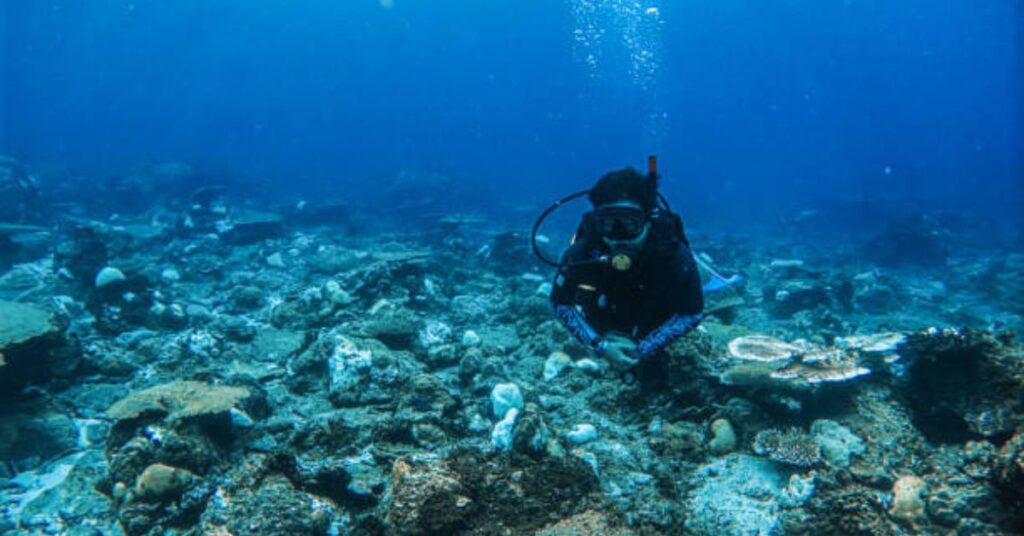
Choosing a Scuba Diving Course
Getting started with scuba diving means taking the crucial first step of proper training and certification. This ensures you dive safely, confidently, and responsibly. Leading international organizations like PADI (Professional Association of Diving Instructors) and SSI (Scuba Schools International) offer a variety of beginner-friendly courses designed to teach you everything you need to know to enjoy scuba diving.
The most popular entry-level course is the Open Water Diver Course, which serves as the foundation for all certified divers. This course teaches fundamental skills, safety procedures, and dive theory. Once certified, you’ll be qualified to dive independently with a buddy up to a recommended depth (typically 18 meters/60 feet).
For those ready to advance their skills, the Advanced Open Water Diver Course introduces deeper dives, navigation, night diving, and other specialized techniques to expand your underwater capabilities and confidence.
What to Expect in Scuba Diving Training
Scuba training combines both classroom learning and hands-on practice to prepare you thoroughly for real-world diving experiences. Here’s what the typical training journey involves:
- Theoretical Lessons: You’ll begin with engaging lessons covering essential topics like the physics and physiology of diving, how scuba equipment works, underwater communication, and safety protocols. This foundation helps you understand how to avoid risks and respond to potential emergencies.
- Confined Water Dives: After theory, you’ll practice vital scuba skills in a safe, controlled environment such as a swimming pool. Here, instructors guide you through breathing underwater, mask clearing, regulator recovery, buoyancy control, and emergency drills. This phase builds your confidence before heading into open water.
- Open Water Dives: Finally, you’ll apply your training in actual underwater settings like oceans, lakes, or quarries. During these open water dives, you practice navigation, buoyancy control, and other skills under instructor supervision. Successfully completing this phase earns you your certification.
Why Certification Matters
Certification is your passport to the underwater world. It’s recognized worldwide and allows you to rent equipment, book dive trips, and dive independently with other certified divers. More importantly, certification ensures you have the knowledge and skills to dive safely, protecting both yourself and the marine environment.
If you’re eager to explore the ocean in 2025, investing time in quality scuba training is the best way to start your underwater adventure on the right foot. Ready to dive deeper into what training courses are available or how to choose the best dive school? Let me know!
Recreational vs. Professional Scuba Diving
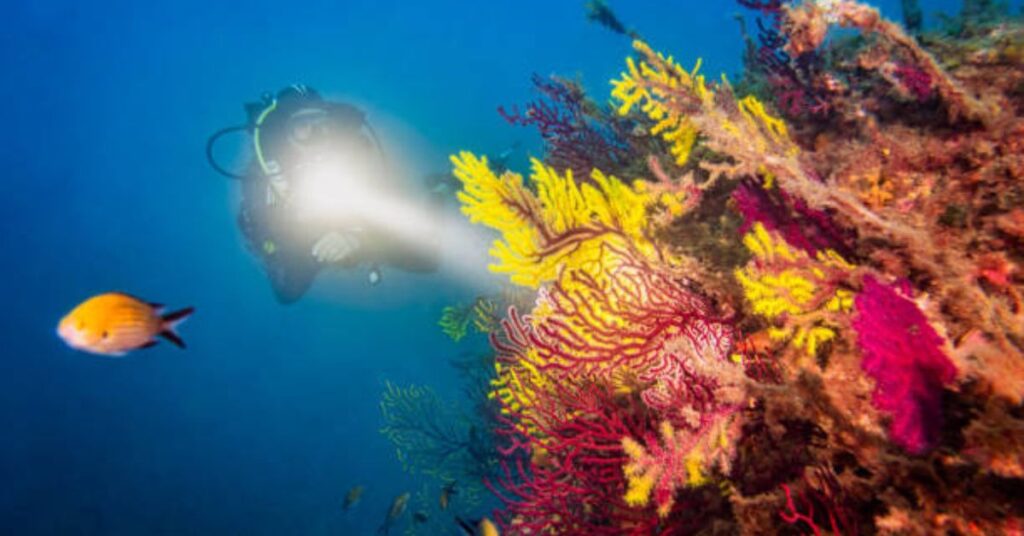
Scuba diving offers a wide range of experiences, from leisurely exploration to specialized professional work. Understanding the differences between recreational and professional scuba diving helps you decide which path suits your interests and goals as you explore the underwater world in 2025.
Recreational Diving
Recreational scuba diving is all about enjoyment, adventure, and connecting with the marine environment. It’s the most common form of diving and is perfect for hobbyists, vacationers, and anyone eager to explore the ocean’s beauty. Popular recreational diving activities include:
- Reef Diving: Dive into vibrant coral reefs that host an incredible diversity of marine life. From colorful fish and graceful sea turtles to intricate coral formations, reef diving offers unforgettable underwater scenery and photo opportunities.
- Wreck Diving: Explore historic shipwrecks, aircraft, and other submerged structures. Wreck diving combines adventure with a touch of mystery and history, as many wrecks serve as artificial reefs attracting unique marine species.
- Night Diving: Experience the underwater world after dark when nocturnal creatures emerge. Night diving provides a completely different perspective, revealing fascinating behaviors and species you won’t see during daylight hours.
Recreational diving focuses on enjoyment, relaxation, and discovery, making it accessible to a broad range of ages and skill levels. It’s a fantastic way to develop new skills, meet like-minded adventurers, and cultivate a deeper appreciation for ocean conservation.
Professional Diving
Professional scuba diving involves specialized training and certification, as it supports critical industries and missions that require advanced skills and expertise. Here are some of the main professional diving disciplines:
- Commercial Diving: Professional divers work underwater on tasks like construction, welding, inspection, repair, and maintenance of infrastructure such as bridges, oil rigs, pipelines, and ship hulls. Commercial diving is physically demanding and requires rigorous safety protocols.
- Scientific Diving: Scientific divers support marine research, environmental monitoring, and conservation efforts. These divers often collect data, conduct underwater surveys, and help study marine ecosystems, coral health, and the impact of climate change.
- Military Diving: Military divers perform tactical missions including underwater reconnaissance, mine clearance, search and rescue, and special operations. These divers require advanced training in combat diving and underwater navigation.
Professional scuba diving demands extensive training, specialized certifications, and often experience in multiple diving environments. While recreational diving emphasizes exploration and enjoyment, professional diving plays a crucial role in industry, science, and national security.
Whether you want to immerse yourself in the breathtaking underwater world for fun or pursue a career that takes you beneath the waves, scuba diving offers diverse opportunities to suit every passion and skill level.
Diving Skills Every Diver Must Master
To enjoy scuba diving safely and responsibly, every diver—whether beginner or experienced—must master a set of essential skills. These skills not only enhance your underwater experience but also protect both you and the fragile marine environment. Here are the key diving skills every diver should practice and perfect:
Buoyancy Control
One of the most important skills in scuba diving is buoyancy control. This involves adjusting your body position and using your buoyancy control device (BCD) to achieve neutral buoyancy, where you neither sink nor float. Good buoyancy control allows you to move smoothly and efficiently through the water without disturbing marine life or damaging delicate coral reefs.
Mastering buoyancy helps conserve energy and air supply, making your dive more enjoyable and extending your bottom time. It also minimizes your impact on the underwater environment, preserving the ecosystem for future divers.
Underwater Communication
Since verbal communication isn’t possible underwater, divers rely on a system of hand signals to convey important messages. Learning and using standard underwater communication signals—such as “OK,” “ascend,” “low on air,” or “danger”—is critical for safety and coordination with your dive buddy or group.
Effective communication ensures you can respond quickly to changes or emergencies and helps create a smooth, confident diving experience.
Mask Clearing
During a dive, it’s common for a mask to fill partially with water. Knowing how to clear your mask underwater is an essential skill. This involves gently exhaling through your nose while tilting your head back to force the water out without surfacing.
Mask clearing allows you to maintain clear vision and stay calm underwater, which is especially important for beginners or in challenging conditions.
Safe Ascents
Ascending safely to the surface is critical to avoid decompression sickness, commonly known as “the bends.” Divers must follow a controlled, slow ascent rate—typically no faster than 9 to 10 meters (30 feet) per minute—and perform safety stops at specific depths to allow dissolved gases in the body to safely off-gas.
Using a dive computer or depth gauge to monitor your ascent speed and stops is essential. Proper ascent techniques protect your health and ensure you can enjoy many safe dives in the future.
By practicing and mastering these core skills, you’ll build confidence and safety underwater. These fundamentals are covered extensively in beginner certification courses and should be regularly refreshed as part of your diving routine.
Benefits of Scuba Diving
Scuba diving is much more than an exhilarating adventure—it offers a wide range of physical, mental, and environmental benefits that enrich your life both underwater and on land. Whether you’re diving in vibrant coral reefs or exploring shipwrecks, here are some of the key benefits that make scuba diving a rewarding activity in 2025 and beyond:
Relaxation and Stress Relief
One of the most celebrated benefits of scuba diving is the deep sense of relaxation it provides. The underwater environment is peaceful and quiet, with only the sound of your own breathing and gentle bubbles. This calm setting helps reduce stress and anxiety, promoting mindfulness and mental clarity.
Many divers describe scuba diving as a form of meditation, where the slow, rhythmic breathing combined with the soothing sights of marine life fosters a profound sense of calm. Diving regularly can improve your overall mental well-being and provide a welcome escape from the fast pace of everyday life.
Physical Fitness and Health
Scuba diving is also a fantastic way to improve your physical fitness. Swimming underwater requires strength, endurance, and flexibility, engaging multiple muscle groups including your core, legs, and arms. It enhances cardiovascular health by increasing your heart rate in a controlled manner.
Moreover, buoyancy control and finning techniques improve balance and coordination. Unlike high-impact sports, scuba diving is gentle on your joints, making it an excellent full-body workout suitable for a wide range of ages and fitness levels.
Environmental Awareness and Conservation
Becoming a diver often ignites a deep sense of environmental awareness. Spending time underwater exposes you to the beauty and fragility of marine ecosystems firsthand. This connection encourages many divers to become advocates for ocean conservation and responsible diving practices.
Scuba diving organizations often promote eco-friendly behaviors such as avoiding contact with coral reefs, participating in underwater cleanups, and supporting marine protection initiatives. By becoming a diver, you join a global community dedicated to preserving the ocean’s health for future generations.
In summary, scuba diving offers a unique combination of relaxation, physical activity, and environmental stewardship, making it a truly enriching pursuit. Whether you dive occasionally on vacations or make it a lifelong hobby, the benefits extend far beyond the water’s surface.
Top Scuba Diving Destinations in 2025
If you’re ready to take your scuba diving adventures to the next level, exploring some of the world’s most spectacular dive sites should be on your bucket list. Each destination offers unique underwater landscapes, diverse marine life, and unforgettable experiences that attract divers of all skill levels. Here are the top scuba diving destinations to explore in 2025:
The Great Barrier Reef, Australia
As the world’s largest coral reef system, the Great Barrier Reef is a must-visit for scuba enthusiasts. Stretching over 2,300 kilometers along Australia’s northeast coast, this UNESCO World Heritage site boasts vibrant coral gardens, thousands of species of fish, sea turtles, sharks, and manta rays.
Diving here allows you to witness one of the most biodiverse ecosystems on the planet, with dive sites suitable for beginners and experienced divers alike. Conservation efforts are ongoing to protect this natural wonder, making it an inspiring destination for eco-conscious divers.
Maldives
The Maldives is famous for its crystal-clear turquoise waters, abundant marine life, and stunning coral atolls. Divers can explore thriving coral reefs, swim alongside whale sharks and manta rays, and discover underwater caves and pinnacles.
This tropical paradise offers year-round diving with excellent visibility, making it ideal for underwater photography and relaxation. Luxury liveaboard trips are popular here, providing access to some of the most remote and pristine dive sites in the Indian Ocean.
Red Sea, Egypt
The Red Sea is renowned for its colorful coral reefs, dramatic drop-offs, and fascinating shipwrecks. Popular dive spots like Sharm El Sheikh, Dahab, and Hurghada attract divers seeking both adventure and ease of access.
The region’s warm waters, rich biodiversity, and relatively calm conditions make it a top choice for beginners and technical divers. Wreck diving enthusiasts will appreciate sites such as the SS Thistlegorm, one of the most famous underwater wrecks in the world.
Galápagos Islands, Ecuador
For a truly unique diving experience, the Galápagos Islands offer unparalleled encounters with rare and endemic species. These volcanic islands in the Pacific Ocean are home to hammerhead sharks, sea lions, marine iguanas, and giant manta rays.
The Galápagos Marine Reserve’s protected status means pristine diving conditions with dramatic underwater volcanic formations. It’s an ideal destination for eco-conscious divers and wildlife enthusiasts looking for an adventurous, once-in-a-lifetime dive trip.
Florida Keys, USA
The Florida Keys are an excellent choice for beginner and intermediate divers. This chain of islands offers warm waters, easy access, and a variety of dive sites including coral reefs, wrecks, and artificial reefs.
Popular spots like Key Largo and John Pennekamp Coral Reef State Park provide well-maintained diving facilities, making the Keys a convenient and welcoming destination for those new to scuba diving or looking for relaxed tropical dives.
Each of these destinations offers unique underwater treasures and experiences to explore in 2025. Whether you want to swim alongside majestic marine creatures, uncover historic shipwrecks, or simply enjoy the tranquility of vibrant coral reefs, these global hotspots have something for every diver.
Scuba Diving Safety Tips
Scuba diving is an incredible way to explore the underwater world, but safety should always be your top priority. Following essential safety guidelines helps prevent accidents and ensures a smooth, enjoyable dive every time. Whether you’re a beginner or an experienced diver, keep these vital scuba diving safety tips in mind:
Never Dive Alone
One of the most fundamental safety rules in scuba diving is never to dive alone. Always dive with a buddy or as part of a group. Having a dive buddy means there’s someone to assist you in case of emergencies, help manage equipment issues, or provide support if you experience difficulties underwater.
Buddy diving also enhances your experience by allowing you to share discoveries and communicate while exploring.
Plan Your Dive
Before entering the water, it’s crucial to plan your dive carefully. Discuss your planned depth, time limits, and route with your buddy and dive leader. Stick to these plans to avoid risks such as decompression sickness or running low on air.
Use dive tables or a dive computer to monitor your no-decompression limits and ascent rates. Always account for contingencies like changing weather or currents, and know emergency exit points in your dive site.
Check Your Gear
Properly functioning equipment is key to a safe dive. Before every dive, thoroughly inspect and test your scuba gear—including your regulator, BCD, mask, fins, and dive computer. Make sure your tank is full, straps are secure, and no leaks are present.
If renting equipment, verify it’s well-maintained and correctly sized for you. Proper maintenance and pre-dive checks help prevent malfunctions underwater.
Monitor Your Air Supply
Keeping track of your air supply is essential to avoid running out of breathing gas underwater. Regularly check your tank pressure gauge throughout the dive and plan your return to the surface with enough reserve air.
It’s a good habit to turn your dive and begin your ascent when your tank reaches about one-third full, allowing time for a safe ascent and safety stops.
Respect Marine Life
As a responsible diver, always respect the marine environment. Avoid touching, chasing, or disturbing marine creatures and corals. Many species are delicate or potentially dangerous if provoked.
Maintaining good buoyancy control helps prevent accidental contact with the reef. Responsible diving practices protect marine ecosystems and ensure that underwater habitats remain vibrant and healthy for future divers.
Conclusion
Scuba diving opens the door to an awe-inspiring underwater world teeming with vibrant marine life, breathtaking coral reefs, and hidden treasures waiting to be discovered. Whether you’re seeking thrilling adventures or peaceful moments of connection with nature, scuba diving offers something truly special for everyone.
By gaining a solid understanding of the scuba diving basics, investing in professional training and certification, and committing to essential safety practices, you can confidently explore the ocean’s depths while protecting yourself and the environment. As you continue your diving journey in 2025 and beyond, you’ll not only create unforgettable memories but also develop a lifelong appreciation for our planet’s precious marine ecosystems.
So, get ready to take the plunge and experience the magic of scuba diving—the ultimate way to explore the ocean like never before!
What is scuba diving?
Scuba diving is an underwater activity where divers use a Self-Contained Underwater Breathing Apparatus (SCUBA) to explore beneath the surface.
What does SCUBA stand for?
SCUBA stands for Self-Contained Underwater Breathing Apparatus.
Do I need certification to scuba dive?
Yes, certification is required for most dives. However, beginners can try Discovery Dives without certification.
Is scuba diving safe?
Yes, when proper training and safety guidelines are followed, scuba diving is a safe and enjoyable activity.
Can I scuba dive if I can’t swim?
Basic swimming skills are recommended, but some dive centers offer beginner experiences for non-swimmers.

